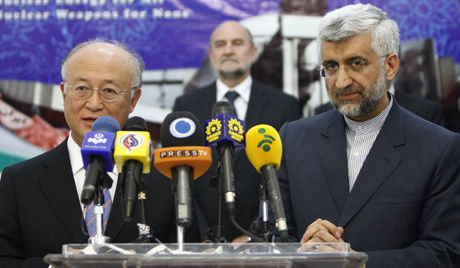Impact of Iran and IAEA Negotiations on the Moscow Talks

Hassan Beheshti Pour: The Western countries’ objective with this structural agreement is to inspect Parchin. Iran maintains that Parchin is basically a military base and no nuclear activity is being conducted on its premises. The IAEA has the duty to supervise nuclear centers. They say that they have received reports that Iran is performing nuclear tests in this area, but they don’t present any evidence to prove their claim. Iran, on the other hand, says that Parchin was inspected twice in 2005, and it cannot allow an inspection of this base whenever the IAEA decides it wants to conduct one. The reason is that Iran believes that there is a possibility for classified military information to be leaked through these inspections. That is why Iran states that agreement on a framework should be reached once and for all so that if Parchin is inspected, it would be clear what sections are going to be inspected, and, if their claims prove to be false, the file should then be closed.
ID: If this agreement is only related to Parchin, shouldn’t we name it a “case agreement”? Isn’t it true that a structural agreement would cover more expansive areas?
HB: One of the main issues of this agreement is Parchin. But it is not only about Parchin. Iran has some expectations of the IAEA. Iran expresses mutual commitments and states that, considering the fact that Iran has fully complied with its obligations with regard to the IAEA, the Agency should also cooperate with Iran.
ID: During recent days, a report has surfaced to the effect that basically within the framework of the NPT, enrichment of uranium is not recognized. What is the basis for such a claim?
HB: Article 4 of the NPT explicitly says that attainment of peaceful nuclear energy is the right of all IAEA members. This is not only the right of these countries, but the Agency should also facilitate the attainment of such a right. Enriching uranium is part of this right, which means that one cannot have nuclear energy without it. This is because it is not clear whether countries producing uranium can always satisfy the needs of others, as was the case with regard to the fuel needed for the Tehran reactor. Therefore, countries should be able to have a complete nuclear fuel cycle and exchanges can concurrently also take place. Since the fuel cycle is under IAEA control, nobody can claim that a diversion has occurred. On this basis, if Iran and the Agency can come to a general agreement, this can certainly be of great help to the negotiations between Iran and the P5+1.
ID: Bearing in mind that no political agreement between Iran and the P5+1 has yet taken shape, is it useful for Iran to have an agreement with the Agency?
HB: One must negotiate and take national interests of the country into consideration, and the red lines of both sides should be recognized. Negotiations will not bear fruit if each side takes a maximalist position. Both sides should cooperate with each other. Both sides should agree on a framework based on which their commitments become clear. If such an agreement is reached, it cannot be one-sided, and no problems can be created.
ID: Will the agreement between Iran and the IAEA lead to a situation where Iran would enter the Moscow talks with more closely tied hands, and not be able to score the necessary points?
HB: An agreement between Iran and the Agency will be signed. Both sides will introduce their demands and then sign the agreement. Iran definitely has interests in this case and will introduce its expectations. In response to Iran's measures, the Agency should also take some measures.
ID: Will the agreement entail benefits for Iran?
HB: If there are no benefits, such an agreement should not be signed. Both sides should come to a bilateral agreement based on a common result-oriented viewpoint. In this agreement, the commitments of both sides will be known. The issue of Iran and the P5+1 is totally different from that of Iran and the Agency. However, these two issues affect each other.

